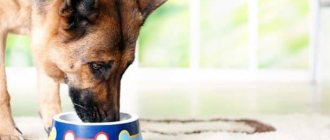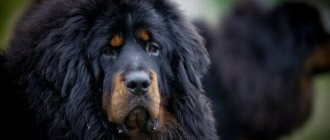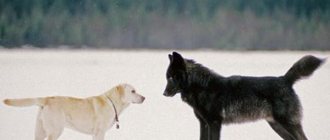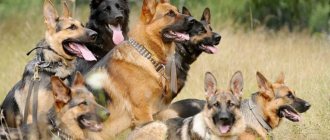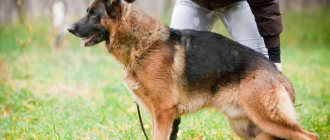What to do if a shepherd’s hair falls out in clumps on its back and body, why does the dog go bald?
Shedding in dogs occurs in spring and autumn and lasts no more than 2-3 weeks. If outside of this time the shepherd's hair falls out on his back and sores appear, then this is a clear sign of the disease.
The cause may be hormonal imbalances, infections, and nutritional disorders. In old animals this is often associated with the physiological characteristics of age. Treatment methods greatly depend on why a shepherd's hair is falling out.
Unbalanced diet
A lack of vitamins, amino acids and minerals leads to inflammatory reactions on the skin, itching, hair loss and flaking of the skin.
The main mistakes when feeding East European Shepherds (VEO) are as follows:
- Combination of natural and industrial feeding. Ready-made branded food is fully balanced in all nutrients. Therefore, if you supplement your dog with natural food, the balance is immediately disturbed.
- Self-feeding with vitamins. An incorrect selection of vitamins will lead to hypervitaminosis, which can also cause hair to fall out in clumps. If you want to give something to improve the condition of the coat, you can feed the dog an egg. It contains a lot of biotin, which is very beneficial for hair.
- The predominance of cereals in the diet. Dogs can easily tolerate porridge, but they are carnivores, so the most normal food would be meat and meat by-products. Therefore, you need to feed your German Shepherd tripe, lungs, kidneys, liver, bones and cartilage, and cottage cheese. Meat should prevail in the diet.
- Frequently feeding your pet liver. It has a very specific composition of proteins, amino acids, vitamins, and microelements. Therefore, frequent feeding leads to an imbalance of nutrients, which causes the shepherd to go bald.
- Feeding with fatty fermented milk products. Dogs' livers cannot digest cheeses, sour cream, cream and other foods with high fat content. You should also exclude pork from your diet, as it also contains a lot of fat.
Symptoms of feeding disorders are often the same:
- the shepherd itches and the hair falls out;
- gray hair;
- dandruff;
- bleeding gums;
- dryness, flaking of the skin;
- allergies.
Nutritional value and amino acid composition of food
Articles about proper nutrition:
- puppies
- adult dogs
It is known that hairs consist of the protein keratin, the chains of which are built from individual links - the amino acids cysteine and methionine. A failure in keratin synthesis results in brittleness and thinning of the hairs. Accordingly, color is determined by melanin, a pigment produced by skin cells called melanocytes and part of the coat. The more pigment contained in the hair, the more saturated and bright the color of the animal.
A quarter of the protein supplied from food goes to the formation of wool, so irrational feeding negatively affects the structure of the German Shepherd's coat, making it heterogeneous, sparse and lacking in natural shine. The problem can arise when there is a lack of animal feed in the diet, or when feeding low-grade proteins that cause a deficiency of essential amino acids.
4.5 g of protein per 1 kg of body weight is required per day , while for young animals this need is twice as high.
Optimal protein intake can be achieved by feeding German Shepherds with high-quality premium and super-premium dry food, or by introducing a sufficient amount of meat, offal, fish and cottage cheese into the home diet.
Hormonal disorders
Hormonal imbalances are primarily divided by the reason why they occur:
- Primary. They appear due to a genetic factor and develop in puppyhood.
- Secondary. They arise as a result of any disease: cancer, infection, systemic inflammatory or autoimmune pathology.
Based on the condition of the coat and skin, we can conclude the type of hormonal disorder:
- With hypothyroidism, hair grows in clumps on the neck and chest, after which alopecia spreads to the back and limbs. In addition, there is lethargy and decline in immunity.
- Decrease in estrogen levels. At the same time, hair growth decreases, it becomes thin and brittle. It is observed in bitches after sterilization.
- Excess estrogen. It can develop in Caucasian Shepherd dogs of both sexes. Hair falls out symmetrically from the sides. In females the vulva swells, in males the foreskin swells.
- Diabetes insipidus. Baldness is distributed evenly throughout the body, with strong thirst, polyuria, and clear urine.
- Decreased concentration of sex hormones. Hair grows on the ears, in the groin area, tail, legs, and neck. An important symptom is atrophy of the genital organs.
Fungal infection
In this case, the hair falls out in places where fungi multiply. These are usually the ears, back, stomach and other open areas. At the same time, neighboring, unaffected areas have healthy hair. At the same time, the skin turns red, and sometimes a pale coating is observed. Areas of redness usually have a round or symmetrical shape. It is not uncommon for an East European Shepherd to scratch the affected areas so that they begin to bleed.
Treatment of alopecia
How to treat hair loss is decided by the veterinarian depending on the cause of the disease:
- If the diet is unbalanced, the diet is normalized. In severe cases, solutions of microelements, vitamins and other missing substances are administered intravenously. It is useful to leave the dog at the clinic to ensure proper feeding.
- Primary hormonal disorders are treated with hormone therapy. The veterinarian may prescribe supportive medications and complex vitamin supplements. However, after successful recovery, the pet will have to be injected with hormones for the rest of its life, since its body does not produce them.
- Secondary hormonal disorders are treated in the same way, but here the elimination of the underlying disease is of great importance. The tumor is removed or chemotherapy is administered, the infection is treated, and anti-inflammatory drugs are prescribed. The prognosis depends entirely on the cause of the hormonal imbalance.
- For fungal infections, antifungal drugs (not antibiotics) are prescribed. However, mycoses occur only in dogs with weakened immune systems, so an important stage of treatment is the use of immunostimulants. After recovery, it is very important to normalize nutrition, since immunity greatly depends on it.
- In the presence of scabies, antiparasitic agents (in drops or tablets) are used. To destroy all parasites, 2-3 applications of the drug will be required. It is very important to remove ticks from all pets at once.
Unbalanced diet
One of the main factors influencing the condition of a shepherd's skin and coat is nutrition. Disorders caused by unbalanced feeding of the animal are usually expressed in inflammatory processes of the skin, itching and the appearance of dandruff.
Treatment for hair loss always begins with a diet analysis. The main mistakes in feeding dogs are as follows:
- lack of mineral salts;
- deficiency of protein, amino acids, unsaturated fatty acids and vitamins;
- food allergies.
Due to a lack of fatty acids, the animal's skin becomes covered with dandruff, an unpleasant odor appears, and the dog begins to go bald. There are primary and secondary fatty acid deficiency. Primary develops if vegetable oil is not added to the feed. Secondary is associated with problems in the animal’s digestive system. If the activity of the liver and pancreas is impaired, the digestion and absorption of fats worsens.
Lack of protein and amino acids leads to slower coat growth. The lack of protein in the diet especially affects the condition of the coat of young dogs; in adult animals, negative consequences will be noticeable with prolonged deficiency.
An imbalance of mineral compounds in the diet leads to a secondary deficiency of salts, which happens quite often and is fraught not only with baldness of the animal, but also with a number of allergic reactions. Primary deficiency of mineral salts occurs in the absence of mineral supplements and is quite rare.
Feeding a dog predominantly cereal leads to a zinc deficiency, which causes the hair that falls out to lose pigment and the animal’s skin to become rough.
To make your pet’s diet balanced, you should add to its food:
- fish fat;
- flaxseed or olive oil;
- fresh liver and kidneys;
- eggs;
- milk;
- seaweed;
- vitamins.
Hormonal diseases
If hair falls out symmetrically throughout the animal’s body, then most likely the cause is a hormonal disease. It can develop due to the following reasons:
- Impaired thyroid function (hypothyroidism). Accompanied by lethargy in behavior and decreased immunity. The hair falls out first on the neck and chest, then on the back, then moves to the limbs. The tail becomes bald only at the base.
- Estrogen deficiency. Usually seen in spayed females. The rate of hair growth decreases, the coat becomes thin and the skin becomes soft.
- Excess estrogen. It is observed in both males and females. Hair falls out on both sides of the body symmetrically. In females the vulva swells, in males the foreskin swells.
- Excess cortisol (Cushing's syndrome). Baldness is accompanied by weight gain and constant thirst.
- The use of hormonal contraceptives and other drugs that change hormonal levels.
- Impaired release of growth hormone into the body. Occurs in males during puberty.
Hormonal diseases are dangerous because they impair the functioning of the cardiovascular system. Before treating an animal, you need to show it to a veterinarian and conduct a comprehensive examination, the most important part of which is laboratory diagnostics, including determining the concentration of hormones in the blood.
Saturation of food with vitamins
For a beautiful and luxurious coat, the dog must, first of all, regularly receive B vitamins.
- Thus, biotin (vitamin B8) regulates the synthesis of keratin in the body, which is the structural unit of wool, and is the main “wool vitamin”.
- B2 ensures the elimination of brittleness and dryness of hairs,
- B6 takes care of skin health
- B9 stimulates coat renewal and eliminates prolonged shedding
- To enhance pigmentation, B3 and B10 are needed.
- Vitamin A promotes elasticity, shine and growth of the coat
- Vitamin E nourishes hair follicles, acting as a powerful antioxidant throughout the body.
- Periodic courses of folic acid are also good for the coat.
Other factors that provoke shedding
Mange is often the cause of baldness in a shepherd dog. The disease is dangerous not only for the animal, but also for its owner. The following signs will help you recognize the presence of scabies mites:
- hair loss begins in the eyelid area and corners of the mouth;
- the size of bald spots does not exceed 1 cm in diameter;
- The animal suffers from itching, it scratches constantly.
In advanced forms of scabies, bald areas cover the entire body of the shepherd dog, and the dog also develops pyoderma.
The German Shepherd, just like other types of dogs, is susceptible to allergic diseases. Adverse reactions can develop to various components in food or treats. It happens that after a dog has tried some new product, it becomes allergic to food that was previously tolerated without problems.
Walks
During a walk, the puppy not only relieves itself, but gets to know the world around it and communicates with other dogs. It is recommended to start walking only after the puppy’s first vaccination, because... there is a high risk of contracting viral diseases. You can go outside earlier, but only in an isolated area where there are no concentrations of dogs nearby.
At first, the owner must regulate the number of walks himself. To teach your puppy to be clean, you should take him outside when he becomes restless and every time after feeding. Such walks should not last long - just wait until the puppy goes to the toilet. It is advisable to have three full walks, about half an hour each.
You should also consider the intensity of the load during the walk. First, the puppy must go to the toilet and then you can let him run around and socialize with other dogs. It’s good to end the walk with basic training, for example, learning your name, getting used to a collar and leash.
Source
Treatment and prevention
After the veterinarian has examined the dog and determined the causes of its baldness, a course of treatment is prescribed:
- Parasite problems are usually treated with tick and flea drops. Sometimes medications are used to rid the body of all unwanted microorganisms, including worm eggs and flea larvae. Such funds can also be used for preventive purposes.
- If a hormonal imbalance is detected, medications that normalize hormonal levels are prescribed.
- If the reason why the dog is losing hair is due to improper nutrition, the unsuitable ingredients are replaced with new ones. If you have a food allergy, you should switch your pet to a different brand of food.
- If the problem of baldness lies in weak immunity, then the veterinarian prescribes immunostimulants. To avoid immunodeficiency, you need to feed your shepherd with fortified complexes.
- It is necessary to treat antibiotics with great caution. Give your dog only those medications prescribed by your veterinarian. Antibiotics are especially effective in treating fungal and infectious diseases.
To prevent unnatural hair loss in your German Shepherd, regularly and thoroughly check the hair coat for parasites. Be careful to ensure that dirt does not accumulate in your dog's ears, and promptly clean out any secretions that accumulate in the hearing organs.
Allergy
A food allergy in a dog can be caused by any protein - soy, chicken, beef, turkey, lamb, fish. Allergic reactions to premium factory feeds are no less common. The only effective method to determine the allergen is to transfer the animal to a separate diet.
The pet will need to be fed food prepared at home from one type of protein and carbohydrates. It is better to use foods that the dog has not eaten before. Sometimes special factory-made dietary products are used for these purposes.
To select a new food for elimination feeding, you need a variety that contains proteins that the dog has not previously consumed.
If the decision is difficult, it is possible to resort to feeding special foods based on hydrolyzed proteins.
Such feeding must be provided to the pet for 2-3 months. If the cause lies in an allergic reaction, within the specified time it will reach the clinical stage of remission. When a provocation is carried out with an allergen protein contained in the previous feed, a relapse will occur within 1-2 weeks. Treatment consists of completely eliminating the allergen from the diet.
Why does a shepherd lose hair?
If your German Shepherd's hair is falling out, it can be either seasonal shedding or a sign of illness. The condition of a dog’s coat depends on many factors: hormonal levels, infectious diseases, nutrition. In addition, during the life of an animal, physiological changes in the body occur, which entails age-related or seasonal changes in fur.
Care devices
Proper coat care directly depends on the structure of the German Shepherd's coat. The dog's coat consists of soft and thick undercoat, guard hairs and hard fibers.
There are two types of hair:
- short-haired;
- long-haired
Shorthair structure
A German Shepherd with this type of coat needs to be brushed twice a week. You will need a massage comb with medium-length teeth. After the main combing, you need to go through a comb, which will do an excellent job of removing the frizz.
Long-haired structure
This type of coat should be combed three times a week with a comb with long, fine metal teeth. But cleaning alone will not be enough, since the brush will only fluff up the ends of the fibers, while the undercoat will remain untouched. To comb out the fuzz, you will need a slicker brush or an elastic wire brush.
You should comb it very carefully so as not to cause discomfort or pain to the shepherd.
Bathing equipment
Don't forget that in addition to combs, you will need special shampoos and balms for bathing dogs.
Water procedures using soap accessories are carried out three times a year, preferably after molting or a few days before preventive measures against parasites.
If your dog gets dirty after a walk, you can wipe the coat with a damp towel or take a quick shower without shampoo.
After water treatments, you will have to comb the dog thoroughly until the coat is completely dry.
Unbalanced diet
One of the main factors influencing the condition of a shepherd's skin and coat is nutrition. Disorders caused by unbalanced feeding of the animal are usually expressed in inflammatory processes of the skin, itching and the appearance of dandruff.
Treatment for hair loss always begins with a diet analysis. The main mistakes in feeding dogs are as follows:
- lack of mineral salts;
- deficiency of protein, amino acids, unsaturated fatty acids and vitamins;
- food allergies.
Due to a lack of fatty acids, the animal's skin becomes covered with dandruff, an unpleasant odor appears, and the dog begins to go bald. There are primary and secondary fatty acid deficiency. Primary develops if vegetable oil is not added to the feed. Secondary is associated with problems in the animal’s digestive system. If the activity of the liver and pancreas is impaired, the digestion and absorption of fats worsens.
Lack of protein and amino acids leads to slower coat growth. The lack of protein in the diet especially affects the condition of the coat of young dogs; in adult animals, negative consequences will be noticeable with prolonged deficiency.
An imbalance of mineral compounds in the diet leads to a secondary deficiency of salts, which happens quite often and is fraught not only with baldness of the animal, but also with a number of allergic reactions. Primary deficiency of mineral salts occurs in the absence of mineral supplements and is quite rare.
Feeding a dog predominantly cereal leads to a zinc deficiency, which causes the hair that falls out to lose pigment and the animal’s skin to become rough.
To make your pet’s diet balanced, you should add to its food:
- fish fat;
- flaxseed or olive oil;
- fresh liver and kidneys;
- eggs;
- milk;
- seaweed;
- vitamins.
Balance of mineral salts
Macro- and microelements such as magnesium, iron, zinc, sulfur, manganese, iodine, copper, silicon, selenium and chromium are necessary for the growth and good condition of the coat. Sufficient intake of minerals from food prevents hair fragility and loss, eliminates dullness and discoloration, regulates the condition of hair follicles and blood microcirculation in the skin layers.
A deficiency of one or another mineral can occur due to an imbalance of substances supplied with food or with the simultaneous introduction of mutually exclusive compounds. In particular, zinc deficiency is observed when dogs are fed boiled cereals and low-quality dry food containing mainly cereals for a long time.
The additional introduction of mineral premixes does not solve the issue, since cereals contain large amounts of calcium-magnesium salt of phytic acid, which binds zinc into compounds inaccessible to the body.
Sometimes manifestations of microelement deficiency are the result of metabolic disorders, for example, baldness due to iodine deficiency can be caused by dysfunction of the thyroid gland.
Hormonal diseases
If hair falls out symmetrically throughout the animal’s body, then most likely the cause is a hormonal disease. It can develop due to the following reasons:
- Impaired thyroid function (hypothyroidism). Accompanied by lethargy in behavior and decreased immunity. The hair falls out first on the neck and chest, then on the back, then moves to the limbs. The tail becomes bald only at the base.
- Estrogen deficiency. Usually seen in spayed females. The rate of hair growth decreases, the coat becomes thin and the skin becomes soft.
- Excess estrogen. It is observed in both males and females. Hair falls out on both sides of the body symmetrically. In females the vulva swells, in males the foreskin swells.
- Excess cortisol (Cushing's syndrome). Baldness is accompanied by weight gain and constant thirst.
- The use of hormonal contraceptives and other drugs that change hormonal levels.
- Impaired release of growth hormone into the body. Occurs in males during puberty.
Hormonal diseases are dangerous because they impair the functioning of the cardiovascular system. Before treating an animal, you need to show it to a veterinarian and conduct a comprehensive examination, the most important part of which is laboratory diagnostics, including determining the concentration of hormones in the blood.
Other factors that provoke shedding
Mange is often the cause of baldness in a shepherd dog. The disease is dangerous not only for the animal, but also for its owner. The following signs will help you recognize the presence of scabies mites:
- hair loss begins in the eyelid area and corners of the mouth;
- the size of bald spots does not exceed 1 cm in diameter;
- The animal suffers from itching, it scratches constantly.
In advanced forms of scabies, bald areas cover the entire body of the shepherd dog, and the dog also develops pyoderma.
The German Shepherd, just like other types of dogs, is susceptible to allergic diseases. Adverse reactions can develop to various components in food or treats. It happens that after a dog has tried some new product, it becomes allergic to food that was previously tolerated without problems.
Many shepherds suffer from seasonal allergens (pollen, weeds, dust); some are allergic to shampoo, medications, and various materials. The consequence of such a reaction, in addition to hair loss, may be:
- rash (especially noticeable on the nose and eye area);
- scratches on the belly, face and paws;
- excessive licking.
Another cause of dog baldness is trichophytosis (ringworm). Accompanied by the appearance of reddish spots, growths and severe peeling of the skin. The hair falls out very quickly, the dog constantly wants to itch.
Many dog owners believe that if they need to bathe their dogs, it should be done very rarely. At the same time, they do not think about the choice of products and wash the animal with laundry soap. Over time, a dog that rarely washes can develop bacterial skin diseases, which will negatively affect not only its coat, but also its overall health. If the detergent is not suitable for the dog’s body, it can cause dryness and flaking of the skin, and baldness.
Hair loss is often associated with severe stress or weakened immunity. The last to suffer are animals that have recently suffered from serious, including viral, diseases.
Presence of ectoparasites and helminths
External parasites include fleas, ticks, lice and lice, which live on the dog’s body, feeding on the animal’s skin secretions and blood. If the body has enough strength and the infection is small, then the coat looks sloppy and dull.
Subsequently, as the number of parasites increases, the dog’s body becomes covered with wounds, scratches and bald spots. Shepherds with flea bite allergies will mercilessly chew themselves to bloody wounds, resulting in extensive, weeping eczema on the tail, rump, and thighs. To kill fleas, special shampoos, sprays, collars and drops on the withers are used.
When affected by microscopic scabies mites, the hair comes out in clumps, starting from the back of the back, and with demodicosis, the primary lesions are usually recorded on the eyebrows, cheeks and limbs. Treatment comes down to treating sick animals with special antiparasitic agents administered in injection or tablet form.
With helminthic infestation, gastrointestinal problems come to the fore (poor appetite, weight loss, vomiting, diarrhea), and with severe infection, segments of parasites or live worms are found in feces and vomit. The condition of the coat reflects the dog’s general soreness and internal intoxication.
To combat helminths, anthelmintic drugs are used to paralyze the worms and remove them naturally.
Treatment and prevention
After the veterinarian has examined the dog and determined the causes of its baldness, a course of treatment is prescribed:
- Parasite problems are usually treated with tick and flea drops. Sometimes medications are used to rid the body of all unwanted microorganisms, including worm eggs and flea larvae. Such funds can also be used for preventive purposes.
- If a hormonal imbalance is detected, medications that normalize hormonal levels are prescribed.
- If the reason why the dog is losing hair is due to improper nutrition, the unsuitable ingredients are replaced with new ones. If you have a food allergy, you should switch your pet to a different brand of food.
- If the problem of baldness lies in weak immunity, then the veterinarian prescribes immunostimulants. To avoid immunodeficiency, you need to feed your shepherd with fortified complexes.
- It is necessary to treat antibiotics with great caution. Give your dog only those medications prescribed by your veterinarian. Antibiotics are especially effective in treating fungal and infectious diseases.
To prevent unnatural hair loss in your German Shepherd, regularly and thoroughly check the hair coat for parasites. Be careful to ensure that dirt does not accumulate in your dog's ears, and promptly clean out any secretions that accumulate in the hearing organs.
Source
How to treat a pet
Considering the above circumstances, treatment is to eliminate the cause. To find out, you need to undergo a doctor's examination.
If a dog suffers from skin parasites, a special removal course is carried out. A number of skin pathogens pose a threat to humans; treatment must be carried out under the supervision of a doctor.
For hormonal causes of hair loss, appropriate correction of the hormonal balance is prescribed. Diseases such as pyoderma, for example, require systemic treatment with antibacterial drugs and the administration of immunomodulatory drugs. In some cases, it is enough to eliminate the allergic factor or provide adequate nutrition for the dog so that the hair stops falling out. Symptomatically, the doctor will prescribe antihistamines.


